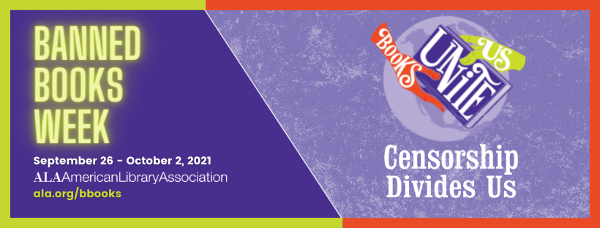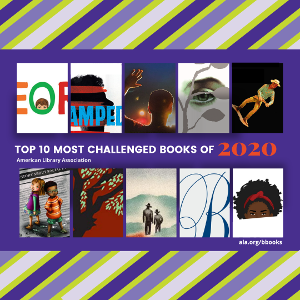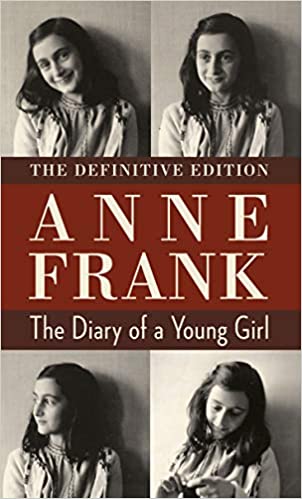Banned Books Week 2021
September 25, 2021 03:22 PM Posted by juliannadouglas

Every year in September, I join the American Library Association (ALA) in celebrating Banned Books Week. Reading is a very fundamental right that can enrich our lives in many ways. That’s why I think that everyone should have the opportunity to read the types of books that they enjoy, which is why I stand against the censorship of reading materials. I sometimes understand the reasons behind why people are offended by certain books, but at the same time, many of these books, if handled properly, could help to open discussions that just might bring people together instead of pushing them farther apart by trying to take them out of everyone’s hands. In my humble opinion, censorship, or worse yet outright banning books, is a very slippery slope. Once you start challenging books that have viewpoints or content with which you disagree, you’re opening a door for people on the opposite side of the spectrum to challenge books you may love. That’s why I simply choose to leave books which I know or suspect will offend me on the shelf.
But what about the kids, you may ask? Shouldn’t we protect them from reading material that may be inappropriate for their age? Well, I believe that only parents have the right to choose what’s appropriate for their children—and only their children—to read. Attempting to make that choice for someone else’s child is not okay, because every family has different values and beliefs about what is appropriate for children to read.
One of my biggest reasons for holding such a strong opinion about censorship has to do with me being a writer who understands the power of storytelling. Storytelling—whether fiction or non-fiction—is a powerful medium that can help foster understanding of our fellow human beings in ways that merely living our daily lives often doesn’t. It can accomplish this by helping us to develop empathy, compassion, and tolerance for others who are different than we are. In these days that are so fraught with conflict, it’s more important than ever to build these tools of humanity within ourselves and we can accomplish that by exercising our right to read. Books can also educate us on a myriad of topics, thereby combating ignorance and helping us to expand our minds in ways we might never have thought possible. All of this perfectly expresses the theme for this year’s Banned Books Week.
 |
This year, the ALA’s official celebration takes place during the week of September 26-October 2, and this year’s Banned Books Week tag line is “Books Unite Us. Censorship Divides Us.” I encourage you to pick up a banned book this month and see if you can find ways to use it to come together with other like-minded readers. To help you get started, check out my social media feeds during Banned Books Week for more insights on banned/challenged books as well as a countdown of the top ten banned/challenged books of 2020. |
Now as part of my celebration I’m going to highlight and give away one of my favorite banned/challenged books, Anne Frank: The Diary of a Young Girl. The book ranked among the top 100 banned/challenged books for the decade 2010-2019 and also made the ALA’s list of most frequently banned/challenged young adult books. My research turned up a few different reasons why this book has been challenged or banned, so here’s where I’ll offer my opinions on these reasons. I’ll preface this section, though, by saying that my research also indicates that there are at least two versions of the book, one of which may contain slightly more content that could be potentially objectionable. It’s a newer version called the definitive edition, which is basically the raw uncensored version. The copy I read was fairly old, so I’m certain it was the original edition with a few parts omitted, so I’m mostly speaking to what was contained in that one.
1. Sexually Explicit/Pornography – First of all, it seems that some people simply throw around the term pornography without having any idea of how it’s actually defined. Pornography is more commonly used to refer to images rather than the written word and the dictionary definition indicates that it’s material that is specifically published for sexual titillation, so this particular objection is undeniably false since the dairy wasn't written or published for that purpose. As to the sexually explicit charge, on a couple of occasions, Anne discusses her maturing body with "Kitty" (the name she gave to her diary), because she finds it rather difficult to talk with her family about these changes. However, it's a very minor part and all done so in a pretty basic and clinical way. As I mentioned, there are multiple editions of the book, and one of the objections I saw to this newer edition was that Anne briefly describes female genitalia in what I thought was a rather humorous, curious, and clinical way (I actually read a small excerpt from it). I don't know if there's more to it than this, but based on the short excerpt I read of this newer version, it's my opinion that kids around middle school age and up should already know these basics, so this really shouldn't be an issue. Also, IMHO, this doesn’t really count as sexually explicit either. Instead it a case of body positivity that some people simply don't like.
2. Homosexual Themes – IMHO, this charge is completely overblown, too. The only thing of this nature in my version is that Anne briefly mentions having kissed a girl and wanting to touch the girl's breasts (it didn't actually happen, though). Since Anne was definitely attracted to boys and at one point described herself as boy-crazy, I couldn't say if this minor incident was an indicator of bisexuality or mere youthful curiosity. But in any case, unless there is more in the definitive edition, it only amounted to one or two lines in the whole book, so not a big deal IMO.
3. “It’s a Real Downer” – This is truly not a joke. Four members of a school textbook committee actually rejected the book on these grounds. All I can say to this is, “Well duh!” Anyone who’s ever heard of Anne Frank, likely knows that she died in a Nazi concentration camp, so of course the book doesn’t have a positive ending. In my opinion, to allow kids to think that life is nothing but sunshine and roses, is doing them a disservice. Life is messy, complicated, and certainly isn’t always happy, so while it did make me incredibly sad and angry, it simply tells the truth of what happened. This is where I’m going to be very blunt and say that to ban/challenge a book of this magnitude for not having a positive ending is pretty much the dumbest reason ever if you ask me.
4. Unflattering Descriptions of Her Mother and Others Living with Them – This is actually true, but my reading of the diary showed that Anne was a very direct person who didn’t mince words. Also, when a teenager writes a diary, they typically have the expectation that it’s a place for their private thoughts and that no one else is ever going to read it. It just so happens that because of its historical significance, it was published and has been widely read. Anyone who has kids knows that realistically they and their parents aren’t always going to get along, and Anne admittedly had a rather troubled relationship with her mother. I feel that her putting these things in her diary were merely a teenager honestly expressing her feelings, and I believe that perhaps kids who are struggling with their own relationships with parents might find a kindred spirit in Anne. As for her depictions of the other people who lived with them in hiding, I’d challenge anyone to live in such a cramped space for years with so many other people and not have bad feelings toward them from time to time that could lead to unflattering descriptions.
While there are a few potential negatives in this story, I feel that the weight of its historical significance alone makes it a must-read for nearly everyone. Shortly before reading the book, I read an article that talked about how little people in their teens and twenties nowadays actually know about the Holocaust, which I find quite saddening. It's extremely important for youth especially to learn about these atrocities, so that we can prevent them from happening again. Taking everything into account, my opinion is that this book (at least the version I read) would be fine for kids of about twelve and up, and particularly so with parental or educator guidance. I know not everyone is going to be persuaded by my arguments, and if this is a book that you know will trouble you, then simply don’t read it. Or if it’s something you genuinely don’t want your child to read, then request that their teacher offer an alternative assignment, but please don’t try to take it out of the hands of teens and others who might learn something from its pages.
So there you have it, my two cents on why Anne Frank: The Diary of a Young Girl is a great story that has found its way onto my keeper shelf, as well as my counter-arguments against the allegations made by those who wish to censor, challenge, and/or ban this book. For anyone who wants to learn more about the experience of Jews in hiding during WWII or who wants to learn more about the atrocities committed by the Nazis, I would encourage those people—as long as they’re middle grade and up—to give it a try if you haven’t already. And to help you achieve that, I’m giving away a copy. Keep reading to learn how you can win it for your own library.
 |
Cover Blurb- Anne Frank |
Read my complete reviews of Anne Frank: The Diary of a Young Girl.
Giveaway
If you would like to win a copy of Anne Frank: The Diary of a Young Girl to see how wonderful it is for yourself, just enter the Rafflecopter giveaway below. One lucky winner will receive their choice of the original or the definitive edition in eBook or print. If the winner chooses an eBook, I will gift it to them via the eBook retailer of their choice (Amazon or B & N). If the winner chooses a print copy, I will have it mailed directly to them via Amazon. Good luck!
International Entrants: You are welcome to enter my contest, but please note that not all eBooks are available in all countries due to copyright restrictions. If this is the case, Amazon offers an option to trade for a gift card (I'm not sure about B & N). If you choose print, I can mail it to you via the Amazon website that services your country, pending availability and cost. Otherwise I will mail it to you via U. S. Amazon's standard international shipping, but it may take up to 6-8 weeks to arrive, and I may not have the capability of tracking the package.
Tags: Anne Frank, Banned Books Week




